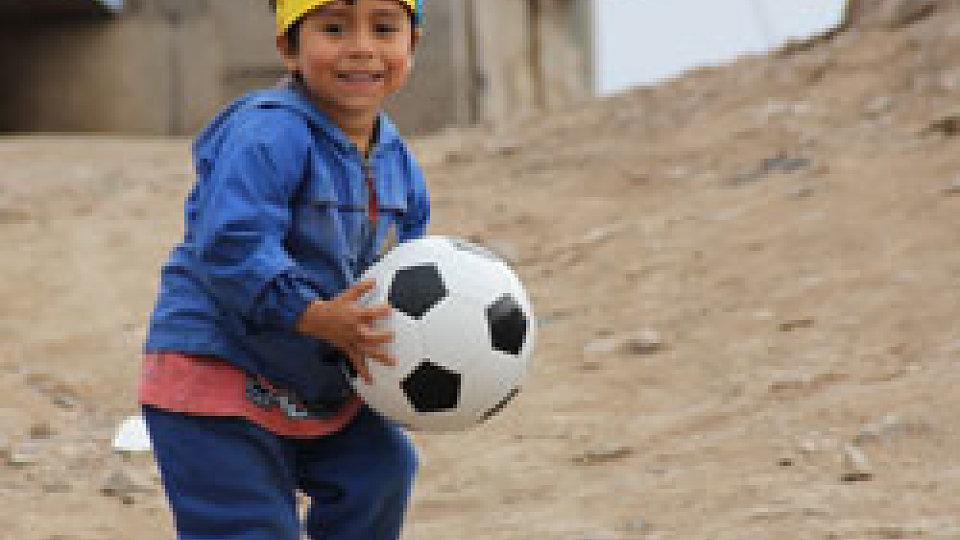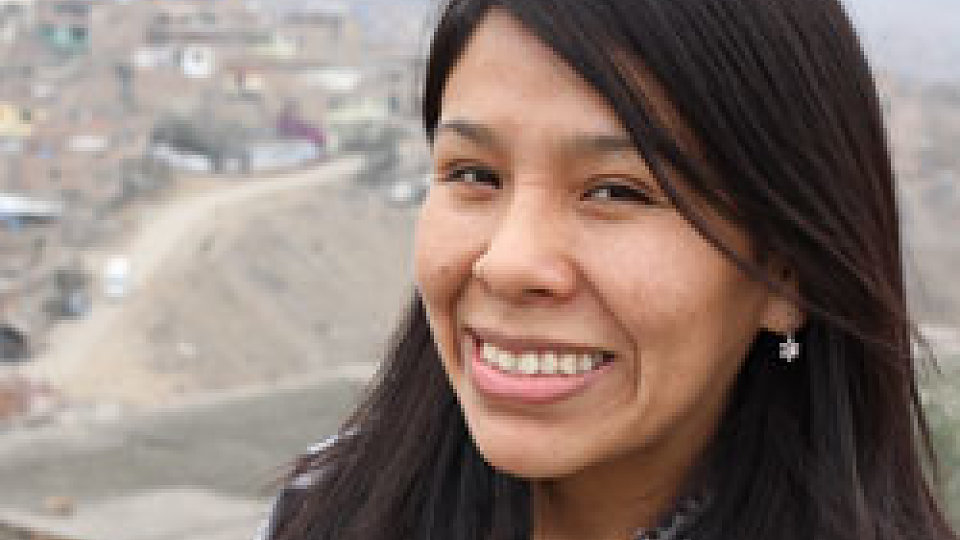Glimpses of Light: Buckner Peru focuses on prevention, healing, strength
By Chelsea Quackenbush
Photography by Scott Collins, Chelsea Quackenbush and Nathan Chandler
Yanet Caceres rose every morning, put on worn-down shoes and left her still-sleeping family. She emerged from her house, a shack with dirt floors, cinderblock walls and a tin roof, with an empty five-gallon bucket. Climbing down 50 yards of steep, rickety stairs built in the dusty hillside, she made her way down to the main path. She walked to the public water barrel, filled her bucket and headed back up the stairs.
Back home, she would empty the bucket into a plastic barrel in the corner of her tiny, dirty kitchen. With several neighbors raising pigs in the back of their homes, sanitation was never an option.
Day in and day out, she repeated her morning ritual.
She climbed back up the stairs with the loaded bucket. She went back down. And back up.
And down.
And up.
And down.
And up.
She spent half a day collecting unsafe water for her family. By time she got home, her four kids were up and running around, and she was exhausted. The water they would use the rest of the day for cooking and drinking was dirty and often contained human and dog waste.
“We were always sick,” she said, her body heavy with the memory.
Caceres’ home is in Talleres Artesanales, one of the poorest communities in Lima, where most families make their living raising pigs. Packs of wild dogs roam the sandy hills, pocked with houses of cinderblock, tin and bed sheets as doors.
The community has a sense of hopelessness hanging over it, but for Caceres and her family, there is one tiny ray they cling to: The water filter from the Buckner Family Hope Center in Pamplona.
And now they’re not as sick as they used to be. Caceres no longer spends half of her day collecting water. Now she can cook, spend time with her family and help in her community.
[hr]
The Hope Center sits on a hilltop at the edge of Pamplona, right next to the wall that divides the wealthier part of the city from the poor. The bright blue building sticks out among all the brown and gray that surrounds it, beckoning families to enter.
Buckner Peru has started an initiative based on prevention – strengthening families to keep them together so children don’t end up in orphanages. Right now, they’re working with 85 families.
“Most of the families are in extreme poverty,” said Claudia Leon, Buckner Peru country director. “There is a lack of education. Also, most families are repeating the cycles they grew up in. They grew up in violent environments and now are repeating the same thing. We’re trying to break those cycles and give them the tools to face life in a different way. We also work with the children so they don’t have to go down that same path.”
Leon estimated that when Buckner first started work in the community, about 90 percent of homes experienced domestic violence. She said many people didn’t know insulting and punching their children were forms of violence because that’s how the parents were raised.
Buckner staff wants to give families the tools to change their lives and they’re doing so in a small space with limited resources. But their goal is healthy families.
One priority of the healthy family program is spiritual enrichment. Giugliana (Julie) Mendoza, the spiritual enrichment and missions coordinator, said the number one spiritual need in the community is “knowing who they are and what God says about who they are. It’s not based on what you do or how much you make because that can change. Who you are in God does not.”
“There are a lot of spiritual needs,” Leon agreed. “It’s very sad when you meet people who are lacking hope. It’s very important for us to work with them and give them a spiritual education to help them develop a personal relationship with Jesus.”
Another priority is to help children excel in school so the staff created an after-school program. When the program first started, Leon said kids in fourth grade read about 20 words a minute and weren’t doing well in school. Now, their grades are better and a lot of them actually like going to school.
Staff is working with parents to develop skills they can use to make money for their families. They’re teaching women to have higher self-esteem and not to allow violence to happen in their homes. Domestic violence has decreased over the past year, Leon said.
“I would say we are very proud of the work we are doing because we can see families staying together, in a better place,” she said. “We’re seeing parents that can fulfill their parental roles in a better way and children can feel they are loved.”
“I think Buckner needs to be here because we, as Buckner in Peru, believe children need a family,” Mendoza said. “The kids who live in orphanages, most of them come from extreme poverty. They have parents but their parents are not able to support them due to financial reasons, or some of them have addictions or violence or family problems.
“But that’s why we’re developing this healthy families program in order to help families and kids before they get taken out of the home because, as I said before, kids need a family. That’s what we believe and that’s why we are working.”
The newest program at the Hope Center is teaching the moms in the community how to make jewelry. It involves tediously crocheting high-quality silver into beautiful necklaces, earrings, bracelets and brooches. The courses started in July and are taught by three girls who live in the Buckner transition home in Lima.
The girls in the transition home learned to make the jewelry in the spring of 2013 after a generous gift from WBGL, a radio station based in Champaign, Ill. The gift made it possible for the girls to take classes so they could sell the jewelry. When Buckner decided to share the program in Pamplona, they thought having the girls teach the moms would be a great way for them to invest in the Buckner family.
Mary Cruz Romero, 23, was nervous when she first started teaching that she would run out of patience. But it turns out she hasn’t and she said it’s “very special” to be able to pass on the skill to other women.
She went to the transition home in January 2011. She had run away from home, from her abusive father. She so badly wanted him to love her and when he didn’t show her love, she took it out on herself.
She used to have a lot of allergies from the stress, which caused acne and other skin issues. Romero was a challenge at first for Buckner stuff but Leon said they would have never given up on her.
Now, Romero will finish school in December with a degree in international business. She has a steady job at a beauty product company where she helps with administrative tasks like invoices, order requests and data entry. Without Buckner, she knows her life wouldn’t be the same.
“The first day, and until today, I always felt like it was a miracle because I couldn’t believe I made it (into the Buckner transition home),” she said. “At first, I was afraid but I have always been focused on my studies, and I still am. I have given all the best of m, studying and developing as a person, and I really don’t have enough words to simply say thanks. I hope I have always shown that appreciation, and I always will. They are a part of my life, the only family I have – forever.”
Leon said Romero has gone through counseling, spiritual development and a lot of personal growth over the past three years.
“It’s amazing how she’s so much better from the inside that you can see it on the outside,” Leon said. “Now she looks like a beautiful, healthier young girl. We are very proud of her.”
[hr]
Talleres Artesanales is typically too far from the Hope Center for families to get to so Buckner Peru staff goes to them. They’ve helped Caceres and several other women to run a community dining room, Comedor Padre Arrupe, a cooperative effort where each family brings some food and cooks with each other, two meals a day.
The kitchen was started by Melba Moran several years ago. At first, it was hard because the dilapidated structure made it easy for vandals to break in but a mission team from Stephenville, Texas, constructed something more safe and secure.
Moran, now in her early 50s, grew up “extremely poor,” she said. She grew up hungry and she said she hates to see anyone suffer in the same way. They have meager equipment and limited supplies but Moran is dedicated to the kitchen. In fact, for awhile, she slept there to keep watch.
Buckner staff has helped her organize the kitchen and implement nutritional meals. The kitchen, also situated on a hill, is another ray of hope beaming out of the community.
[hr]
The first group to enter the Cusco transition home is about to graduate and head out into the world on their own.
Ursula Elena Perez Ascona, 24, is one of the original four. She has a smile and a laugh that lights up all of Cusco. It masks how afraid she is to leave the home in August. She’s been there since 2008 and while she is scared, she’s also ready – Buckner has prepared her well.
“Buckner has been really significant in my life because without them, I wouldn’t have finished a (college) career and I wouldn’t be a professional,” she said. “I wouldn’t have a career at all. So they have been a huge part of my life all this time, and now that I’m leaving, I will miss them. I’m a bit afraid to live alone but I am very happy for the support.”
Before she came to Buckner, Ascona lived at Buen Pastor, an all-girls orphanage, for five years. Her parents died when she was 14. Her brothers went to live somewhere else. Now, she goes back to Buen Pastor and volunteers her time to work with the girls. She said she is motivated to help others because of God and because of all the people who visited her when she lived there.
She’s working at a bank, Pro Mujer (Pro Woman), which provides credit to small groups of women who have little economic resources. She said she loves her job and her dream is to move up through the company, and some day, have her own.
During her time in the home, she learned how to cook, crotchet and how to take care of herself physically, emotionally and spiritually. Without the home, Ascona guessed she’d probably have kids, and she definitely wouldn’t have an education or a career.
“Buckner helped me a lot in a spiritual way because it taught me what the Word of God is,” she said. “Through this, I learned there are people out there who love us, despite not having my parents. Buckner has helped me develop as a person and improve my self-esteem because when my parents died, I wasn’t that good, you know? I only thought about bad things, things that weren’t right for my life, and Buckner has helped me go the right path in life.”






Add a Comment